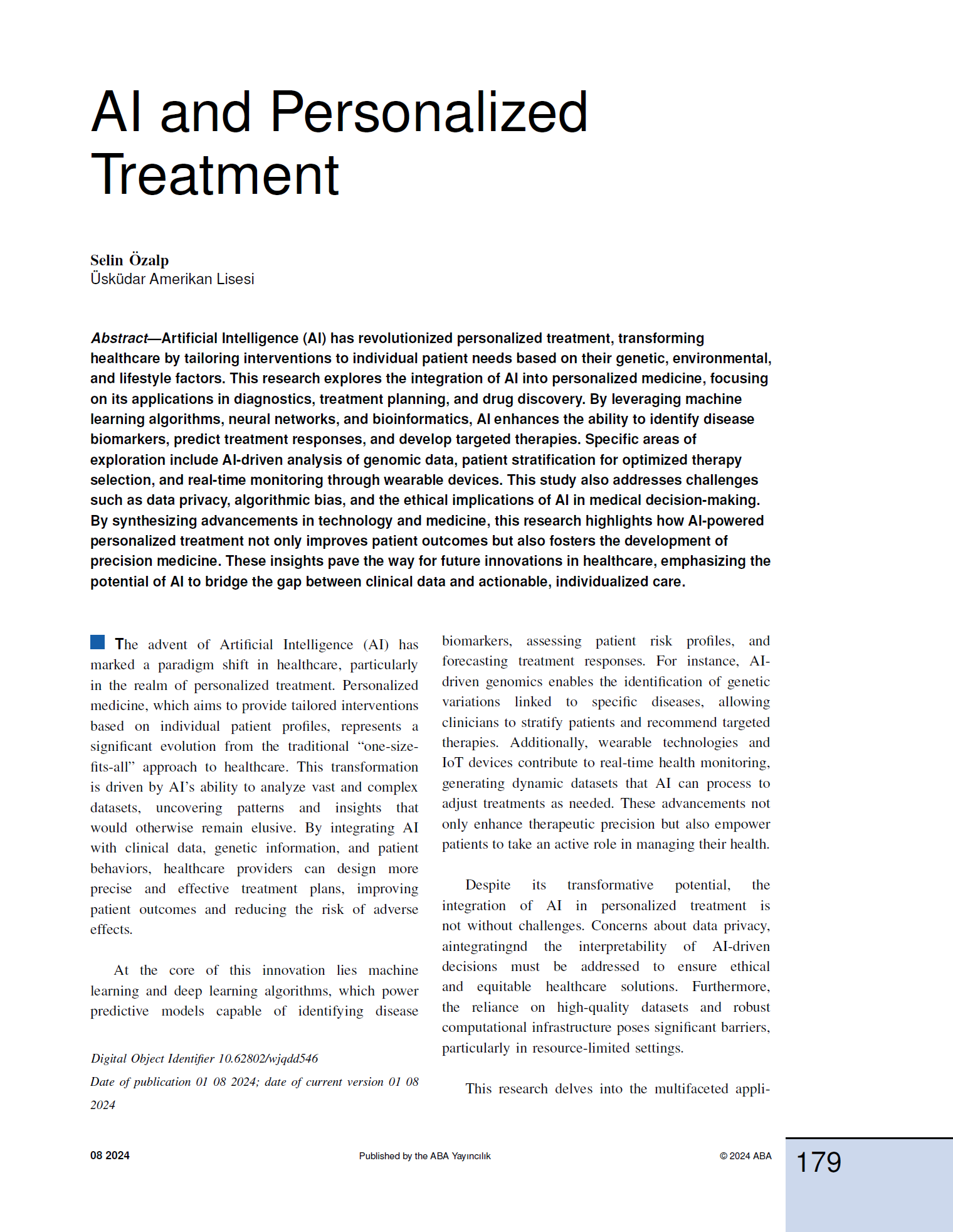AI and Personalized Treatment
DOI:
https://doi.org/10.62802/e6fyw805Keywords:
Artificial Intelligence, personalized treatment, precision medicine, machine learning, biomarkers, genomics, patient stratification, wearable devices, algorithmic bias, healthcare innovationAbstract
Artificial Intelligence (AI) has revolutionized personalized treatment, transforming healthcare by tailoring interventions to individual patient needs based on their genetic, environmental, and lifestyle factors. This research explores the integration of AI into personalized medicine, focusing on its applications in diagnostics, treatment planning, and drug discovery. By leveraging machine learning algorithms, neural networks, and bioinformatics, AI enhances the ability to identify disease biomarkers, predict treatment responses, and develop targeted therapies. Specific areas of exploration include AI-driven analysis of genomic data, patient stratification for optimized therapy selection, and real-time monitoring through wearable devices. This study also addresses challenges such as data privacy, algorithmic bias, and the ethical implications of AI in medical decision-making. By synthesizing advancements in technology and medicine, this research highlights how AI-powered personalized treatment not only improves patient outcomes but also fosters the development of precision medicine. These insights pave the way for future innovations in healthcare, emphasizing the potential of AI to bridge the gap between clinical data and actionable, individualized care.
References
Batra, P., & Dave, D. M. (2024). Revolutionizing healthcare platforms: the impact of AI on patient engagement and treatment efficacy. International Journal of Science and Research (IJSR), 13(10.21275), 613-624.
Chan, W. (2024). AI-Driven Personalized Treatment Planning in Radiology: Architectural Design and Implementation Strategies. Quarterly Journal of Emerging Technologies and Innovations, 9(2), 60-80.
Kasula, B. Y. (2024). Advancements in AI-driven Healthcare: A Comprehensive Review of Diagnostics, Treatment, and Patient Care Integration. International Journal of Machine Learning for Sustainable Development, 6(1), 1-5.
Khan, U. (2024). Revolutionizing personalized protein energy malnutrition treatment: Harnessing the power of Chat GPT. Annals of Biomedical Engineering, 52(5), 1125-1127.
Kukalakunta, Y., Thunki, P., & Yellu, R. R. (2024). Deep Learning-Based Personalized Treatment Recommendations in Healthcare. Hong Kong Journal of AI and Medicine, 4(1), 30-39.
Li, B., Li, Y., Zhou, H., Xu, Y., Cao, Y., Cheng, C., ... & Yu, D. (2024). Multiomics identifies metabolic subtypes based on fatty acid degradation allocating personalized treatment in hepatocellular carcinoma. Hepatology, 79(2), 289-306.
Sherani, A. M. K., Khan, M., Qayyum, M. U., & Hussain, H. K. (2024). Synergizing AI and Healthcare: Pioneering Advances in Cancer Medicine for Personalized Treatment. International Journal of Multidisciplinary Sciences and Arts, 3(1), 270-277.
Praet, J., Anderhalten, L., Comi, G., Horakova, D., Ziemssen, T., Vermersch, P., ... & Paul, F. (2024). A future of AI-driven personalized care for people with multiple sclerosis. Frontiers in Immunology, 15, 1446748.
Udegbe, F. C., Ebulue, O. R., Ebulue, C. C., & Ekesiobi, C. S. (2024). AI's impact on personalized medicine: Tailoring treatments for improved health outcomes. Engineering Science & Technology Journal, 5(4), 1386-1394.
Xing, Y., Yang, K., Lu, A., Mackie, K., & Guo, F. (2024). Sensors and devices guided by artificial intelligence for personalized pain medicine. Cyborg and Bionic Systems, 5, 0160.









